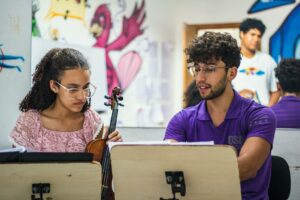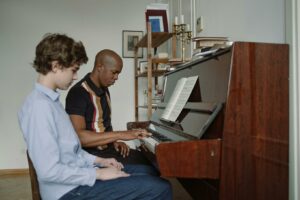Georgia Tech’s Music Technology program stands at the intersection of creativity and innovation, offering students a unique blend of musical artistry and cutting-edge technology. This program is designed for those who dream of pushing the boundaries of how music is created, performed, and experienced. By merging traditional music study with advanced technological skills, Georgia Tech prepares its students to lead in the ever-evolving music industry.
Nestled in the heart of Atlanta, a city known for its vibrant music scene, Georgia Tech provides an ideal environment for aspiring music technologists. Students have access to state-of-the-art facilities and are encouraged to collaborate on projects that challenge conventional music paradigms.
Georgia Tech Music Technology

Georgia Tech’s Music Technology program integrates music with cutting-edge technology to foster innovative research and development. The program, part of the School of Music, offers undergraduate and graduate degrees focusing on technical and creative disciplines. Faculty with expertise in fields like acoustics and digital signal processing guide students in projects that blend music, computing, and engineering.
Facilities include the Center for Music Technology and the W.C. Sister Center for Music & Technology. These centers provide resources such as state-of-the-art studios and research labs. They support experimentation in areas like computer music composition, performance modeling, and interactive music systems.
The program encourages interdisciplinary collaboration, partnering with entities such as the Georgia Tech Research Institute and external organizations in Atlanta’s vibrant music scene. Students engage with a curriculum that balances theoretical knowledge and practical experience, preparing them for careers in multimedia, sound design, and audio engineering.
Curriculum And Courses
Georgia Tech’s Music Technology program delivers a comprehensive curriculum that blends theoretical foundations with practical skills. Students embark on a journey through diverse courses covering music and technology.
Key Subjects And Skills

Core courses in the program emphasize digital signal processing, acoustics, and software design. These subjects build foundational skills necessary for innovative music technology applications. Students learn to use industry-standard software and hardware, gaining expertise in areas such as audio effects processing, music synthesis, and interface design. Programming courses further empower students to develop custom tools and applications for music production and research.
Notable Projects And Research
Students engage in projects that push the boundaries of music technology. Past projects include interactive music systems that respond to user input in real-time, and machine learning models for music classification and composition. Research initiatives focus on areas like spatial audio and augmented reality experiences in music contexts. These opportunities allow students to collaborate with faculty and industry partners, fostering a rich environment for creative and technological exploration. The program’s alignment with organizations such as the Georgia Tech Research Institute provides students with access to cutting-edge technologies and methodologies.
Faculty Expertise
Georgia Tech’s Music Technology program boasts a diverse faculty with deep expertise in areas crucial to the intersection of music and technology. Professors guide students through both technical and creative landscapes.
Leading Professors

Key faculty members include Dr. Gil Weinberg, known for his work in robotics and musical expression, and Dr. Alexander Lerch, who specializes in music information retrieval and computational models of music. Dr. Jason Freeman focuses on interactive music systems, while Dr. Grace Leslie explores the use of music technology in therapeutic and healthcare environments. These professors bring a wealth of knowledge, contribute to the program’s innovative curriculum, and foster a research-driven environment.
Collaborative Opportunities
Faculty collaboration extends beyond academia. The program encourages partnerships with industry leaders and research institutes, including the Georgia Tech Research Institute. Students participate in projects with organizations in Atlanta’s music industry, enhancing practical learning and professional networking. These collaborations offer students unique opportunities to engage with cutting-edge technologies in real-world settings, broadening their expertise in emerging music technologies.
A Vibrant Learning Environment

Georgia Tech’s Music Technology program stands as a beacon of innovation at the intersection of music and technology. By leveraging Atlanta’s rich musical culture and state-of-the-art facilities, the program prepares students for dynamic careers in the music industry. With a curriculum that balances technical prowess and creative exploration, students are well-equipped to lead and innovate. The diverse faculty and collaborative opportunities further enhance the learning experience, ensuring that graduates are not just participants but pioneers in their fields. As a result, the program continues to produce professionals who make significant contributions to the world of music technology.

